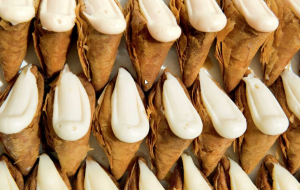As the festive season approaches, households are ablaze with preparations for these special days. Homes and cities are adorned, with sweets taking center stage.
In Greece, Christmas without melomakarona and kourabiedes is unimaginable.
But where did the names of these famous festive sweets come from, and what journey did they take before finding their way onto Christmas plates?
The “Mournful” Melomakarona
Etymologically, melomakarona have ancient Greek origins. Dictionaries mention that the word “makaroni” derives from the medieval Greek word “makarōnia,” which referred to a funeral meal based on pasta. It was consumed during funerals to bless the deceased.
The word “makarōnia” comes from the ancient Greek word “makaria,” which represented a type of cake or bread given after a funeral. This piece of bread, similar in shape to melomakarona, was offered after the funeral rites.
At some point, this bread was dipped in honey, and from the words “honey” and “makaria,” melomakarona emerged, solidifying their place as Christmas sweets.
Melomakarona are a staple on every Christmas table.
Kourabiedes with an Eastern Air
Although Greeks cherish kourabiedes, the quintessential Christmas sweet doesn’t have Greek origins.
The word originates from the Turkish “kurabuye” or, more precisely, the Arabic “qurabiya,” which translates to a type of double-baked sweet.
This delicacy, primarily made from flour and sheep or goat butter, is believed to have originated in 7th-century Persia. With the gradual spread of sugar in the region, it became known among the Balkan peoples and in Turkey.
In Greece, the most traditional kourabiedes are considered those of Nea Karvali. Refugees from Karvali in Cappadocia settled in the Kavala region in 1924, establishing Nea Karvali and bringing with them the traditional recipe for kourabiedes, prevalent in Asia Minor.
In Aetolia-Acarnania, kourabiedes are a year-round treat. They symbolize joy, prepared by housewives for baptisms and weddings. The snowy white color of the powdered sugar on top seems to make it the ideal choice for days of happiness.




